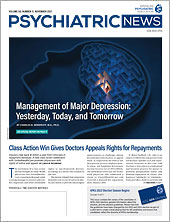The early weeks after a moderate to severe traumatic brain injury (TBI) can be frightening for patients and their loved ones, especially if a patient has severe impairments in function. Yet there is reason to have hope: A study in JAMA Neurology has found that more than half of these patients will experience major functional improvements after 12 months, suggesting that in many cases recovery is not only a matter of good care, but of time.
“Our data indicate that the degree of impairment evident during the first two weeks postinjury should not be taken as a definitive indicator of unfavorable long-term functional outcome,” wrote Michael A. McCrea, Ph.D., a professor in the Department of Neurosurgery at the Medical College of Wisconsin in Milwaukee and colleagues.
The researchers analyzed data from 484 patients with moderate to severe TBI in the Transforming Research and Clinical Knowledge in TBI (TRACK-TBI) study. This prospective, multicenter observational study, conducted at 18 level 1 trauma centers in the United States, enrolled patients with TBI between February 26, 2014, and August 8, 2018. The researchers focused on patients who were at least 17 years old at enrollment and had either a moderate TBI (defined by a Glasgow Coma Scale, or GCS, score of 9 to 12) or a severe TBI (a GCS score of 3 to 8) within 24 hours of their injury. Patients were assessed in person at two weeks, six months, and 12 months or by telephone if an in-person visit was not possible. All patients were assessed at three months by telephone. If patients were too impaired to respond for themselves, their designated proxies provided responses.
At each assessment, the patients’ function was evaluated using the Glasgow Outcome Scale-Extended (GOSE). Patients were asked to report functional difficulties in six major life domains (independence in the home, independence outside the home, work functioning, social/leisure functioning, relationship problems, and other problems that affect daily life) and to report only problems that were worse than those they may have had before their TBI. Participants were also assessed using the Disability Rating Scale (DRS), which evaluates the degree of impairment in life function after TBI in four domains: consciousness (for example, eye opening, communication ability, motor response), cognitive ability (for example, to feed and groom oneself), overall level of functioning, and employability.
Overall, the 12-month mortality rate was 30.6% in the severe TBI group and 13% in the moderate TBI group.
In the moderate TBI group, 41% had a “favorable” outcome, defined by a GOSE score of greater than or equal to 4, within two weeks of their injury. Over time this increased such that 75% of patients with moderate TBI who were still in the study at 12 months had at least a favorable outcome. Among those with moderate TBI who were still in the study at 12 months, 35% achieved a good recovery as defined by a GOSE score of 7 to 8, and 19% had a complete recovery. At two weeks 79.2% in the moderate TBI group had moderate disability or worse as defined by a DRS sore of at least 4. Among those who were still in the study at 12 months, 32% reported no disability and 15% reported only mild disability.
In the severe TBI group, 12.4% had achieved a favorable outcome within two weeks of their injury. However, over time this increased such that 52.4% who were still in the study at 12 months had at least a favorable outcome. Among those with severe TBI who were still in the study at 12 months, 22.9% achieved a good recovery and 12.5% had a complete recovery.
At two weeks, 92.9% in the severe TBI group had moderate disability or worse as measured by the DSR. Among those who were still in the study at 12 months, 19% reported no disability and 13.9% reported only mild disability.
“While a substantial proportion of patients die at high rates or incur considerable lasting disability, there is growing evidence that severe acute impairment … does not portend uniformly poor long-term functional outcomes,” McCrea and colleagues wrote. “Accordingly, clinicians should be cautious about suggesting a high likelihood of permanent severe disability within the first two weeks postinjury, … and early prognostic counseling and decision-making about withdrawal of life-sustaining care should acknowledge the limitations of prognostic certainty.”
“This study is an important reminder of how we need to be humble in medicine in terms of our prognostication and estimation of recovery trajectory,” Davin Quinn, M.D., who was not involved in the research, told Psychiatric News. Quinn is a professor of psychiatry, vice chair of adult clinical services, and chief of the Division of Behavioral Health Consultation and Integration at the University of New Mexico School of Medicine in Albuquerque. “A great deal of change and improvement can happen in the first year after a TBI. The patient you see at two weeks can look very different by three months and again very different a year after the injury.”
The study was funded by the National Institutes of Health, the National Institute of Neurologic Disorders and Stroke, and supported in part by the U.S. Department of Defense. Patient travel and stipend expenses were supported by One Mind. ■
“Functional Outcomes Over the First Year After Moderate to Severe Traumatic Brain Injury in the Prospective, Longitudinal TRACK-TBI Study” is posted
here.

